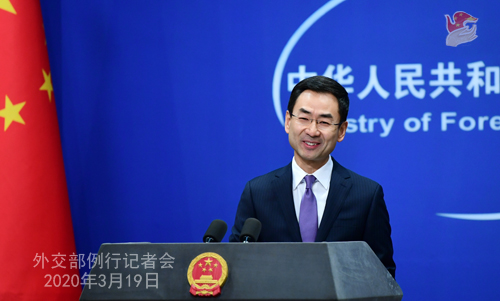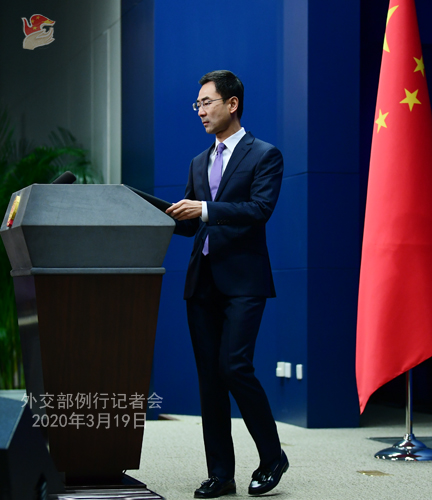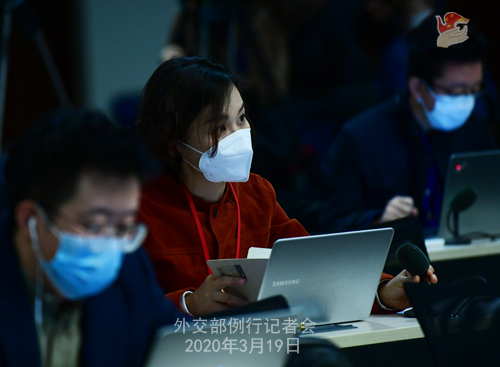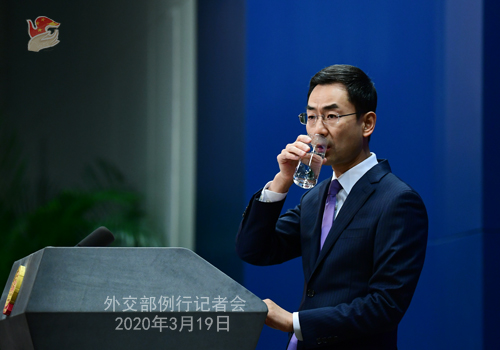| Foreign Ministry Spokesperson Geng Shuang's Regular Press Conference on March 19, 2020 |
| 2020-03-19 20:30 |
|
According to the latest figures from the NHC, March 18 saw 819 patients cured and discharged from hospital in China's mainland, bringing the tally to 70,420. Local governments in China have donated masks, protective gowns, nucleic acid test reagents and other medical supplies to their sister cities in the ROK, Japan, Iran, Italy, Lebanon, Pakistan, Iraq, Malaysia, Laos, Algeria, Tunisia, France, Peru, Angola, Switzerland and Germany. Local enterprises in China also provided medical supplies such as masks and protective suits to local governments and Red Cross organizations in the ROK, Iran, Italy and Germany as well as their diplomatic missions in China. On the afternoon of March 20, the Chinese foreign ministry, the National Health Commission and the General Administration of Customs will hold a video conference with more than 10 Eurasian and South Asian countries to share information and experience on COVID-19. We will release more details about the conference in a timely manner. Since the outbreak, Eurasian and South Asian countries have lent effective support and help to China. Recent days have seen the pandemic spreading and situation getting worse in these countries. Some countries have asked China for assistance and expressed their urgent wish to emulate China's experience in coping with COVID-19. With the vision of a community with a shared future for mankind, while making all-out efforts at home, China will do whatever it can to support and assist its friendly neighbors in the spirit of solidarity amid adversity, deepen cooperation with other countries, share its experience in pandemic control and treatment, and work with others to uphold regional and global public health security. Q: You announced on Tuesday a video conference with healthcare specialists from African countries. How did the meeting go? Is the outcome of the meeting up to expectations? A: On March 18, China held an online video conference with nearly 300 officials and healthcare specialists from the Africa CDC and 24 African countries. The conference lasted three and a half hours and achieved good results. Chinese experts detailed the trend and features of the pandemic and shared China's experience and practices in epidemic control and clinical treatment. They also gave thorough answers to almost 50 questions from the African side. The African officials and specialists considered this video conference timely, professional and effective. They spoke highly of China's effective battle against the pandemic and important contributions to global public health security. They stressed that China's experience and practices are exemplary and have set standards for African countries' response. They will continue to strengthen cooperation with China and fight together to win the battle against the pandemic. Going forward, while continuing to strengthen epidemic control at home, we will share all we know about the pandemic with African countries, and do our best to support and help these countries and regional organizations in accordance with their needs. Together we will strive for an early victory against the disease and protect regional and global public health security. Q: China announced reciprocal countermeasures on some American media organizations yesterday. First question, according to some US officials and analysts, American people can watch CGTN in the US; China Daily and People's Daily overseas edition can get published freely in the country, and China Daily has cooperation with the three American newspapers subject to China's countermeasures. By contrast, none of the American newspapers or TV shows are accessible to Chinese citizens here. That's why they think it's not really reciprocal. I wonder if you could respond to that? Second question, we learned that the credentials of many Chinese employees working in American media agencies have been revoked by a subsidiary of the foreign ministry. According to Chinese laws, foreign media in China's mainland cannot hire Chinese employees directly; the employment must be through this subsidiary. This indicates that these Chinese employees are deprived of opportunities to work for the foreign media organizations. Given that the US measures only target Chinese employees in the US, can you give us any explanation for China's move? A: I'll take your second question first. The Chinese competent authorities, including the subsidiary you mentioned, have been lawfully managing affairs related to Chinese employees of foreign media agencies in China. Your first question was about reciprocity. Each country has its unique national conditions, public opinion environment, media ecology and related laws and regulations. Regarding this matter, all countries should respect each other's domestic conditions and customary practices. As we repeatedly stressed, we welcome foreign media and journalists, including those from the US, covering news in China according to law and regulation, and we provide convenience and support for them. What we oppose is ideological bias against China, fake news in the name of press freedom, and violation of professional ethics. As we keep saying, our fundamental state policy of opening-up hasn't changed and will remain unchanged. We hope foreign media and correspondents can play a constructive role in enhancing mutual understanding between China and the world.
Q: In response to US oppression of Chinese media, China announced countermeasures yesterday, saying that in response to the discriminatory restrictions the US has imposed on Chinese journalists with regard to visa, administrative review and reporting, China will take reciprocal measures against American journalists. Could you specify any restrictive measures taken by the US? What reciprocal measures are you going to take specifically? A: The All-China Journalists Association has made public the discriminatory restrictive measures the US imposed on Chinese journalists, which can also be found in some recent Chinese media reports. You may read them for the details. I'd like to stress that in recent years, the US government has placed unwarranted restrictions on Chinese media agencies and personnel in the US, purposely made things difficult for their normal reporting assignments, and subjected them to growing discrimination and oppression. The Chinese journalists' normal life and work have been severely disrupted. Many of them were even unable to return to the US after visiting their families back in China because the US denied their visas without cause. They also had to provide a lot of additional materials when reapplying for visas. In December 2018, the US demanded certain Chinese media organizations in the US to register as "foreign agents". In February 2020, it designated five Chinese media organizations in the US as "foreign missions" and then put in place a personnel cap, which is massive expulsion of Chinese journalists in all but name. Everyone can judge from the facts that the so-called freedom of the press claimed by the US is a hypocritical and deceptive concept. China has repeatedly lodged solemn representations with the US over its wrong practices and expressed firm opposition and strong condemnation. The Chinese media in the US, under such oppression and discrimination, have been bearing and forbearing for a long time. But this only emboldens the US to go even further. Faced with unfair treatment, unwarranted oppression, double standards and bullying practices, the All-China Journalists Association has spoken on behalf of the Chinese media to expose what the US did and express firm opposition. We support the Chinese media in safeguarding their reputation and interests. China has no choice but to take corresponding measures against US media and journalists in the spirit of reciprocity. Q: According to media reports, the Haitian government ordered Taiwan's representative Liu Bangzhi to leave the country within 72 hours after he got into a fierce argument with President Jovenel Moise. What's your comment? A: We noted media reports on that. The overwhelming majority of countries in the world recognize the one-China principle, which is a basic norm governing international relations and a universal consensus of the international community. In recent years, some of the Latin American and Caribbean countries, for instance Panama, the Dominican Republic and El Salvador, followed the historical trend and established diplomatic relations with China based on the one-China principle. China's cooperation with these countries, featuring mutual benefit and mutual respect, has yielded fruitful results and brought tangible benefits to their people. This stands in sharp contrast to the situation of Haiti and other "allies" of Taiwan, who know better than anyone how things stand. I want to stress once again that there is no way out for the Taiwan authorities to pursue "two Chinas" or "one China, one Taiwan". I believe relevant countries can be soberly aware that only an early recognition of the one-China principle is the right choice that meets the fundamental and long-term interests of their own people. Q: Saudi Arabia, as the rotating chair of G20 nations, proposed to convene a video conference for G20 leaders to address the challenges posed by COVID-19. What is your comment? A: As the pandemic spreads in many parts of the world, it has triggered public health crisis in multiple countries, leading to serious economic, financial and social impacts. At this critical juncture, the world's major economies, while doing epidemic prevention and control at home, should step up policy coordination and international cooperation to jointly tackle the pandemic and maintain world economic stability. As the premier forum for international economic cooperation and an important platform in response to global crisis, the G20 should promote partnership of mutual assistance and play a leading role in combating the pandemic and stabilizing the economy. G20 countries need to coordinate actions, send positive messages of solidarity and cooperation to overcome difficulties, safeguard the health and well-being of people in all countries, boost confidence in the international market, and work to ensure strong, sustainable, balanced and inclusive growth of the world economy. Since the outbreak of the pandemic, with the vision of a community with a shared future for mankind, China has been actively participating in international cooperation while doing its best to combat the virus domestically. China will continue working with the international community through the G20 and other platforms to contribute the Chinese wisdom and Chinese proposals for better response to global public health security challenges and for the common interests of all mankind.
Q: According to the United Nations, after consulting with China, the second United Nations Global Sustainable Transport Conference, which was scheduled to be held in Beijing from May 5 to 7, will be postponed in light of the COVID-19 pandemic. The UN will further consult with China to identify a new date. Can you confirm that? A: The second United Nations Global Sustainable Transport Conference was scheduled to be held in Beijing from May 5 to 7. In light of the coronavirus pandemic, after consulting with each other, China and the United Nations decided to postpone the conference. A new date, subject to the development of the pandemic, will be identified after further consultation. China attaches high importance to this conference. We hope it will contribute to a stronger global partnership on connectivity, deeper regional and global economic integration, and better implementation of the 2030 Agenda for Sustainable Development and a community with a shared future for mankind. We look forward to hosting it at a proper time this year when the situation gets better. We will keep in contact with the UN regarding the date and other arrangements. Q: US Secretary of State Mike Pompeo yesterday hit out at China for alleged "disinformation campaign". President Trump and other US officials also mentioned on several occasions that it is irresponsible and unacceptable for China to attribute the coronavirus to the US military. Critics say at a time when sound China-US ties are needed, the relationship between the two countries has taken a nosedive due to such spat. What's your response? A: Recently amid the COVID-19 pandemic, paying no respect to science and WHO advice, some US high-level officials and congress members have been stigmatizing China in their slanders against our country, which has triggered strong indignation among the Chinese people. China firmly opposes and condemns such smears. Since the outbreak, in an open, transparent and responsible spirit, China has been providing timely updates to WHO and other countries and regions, the US included, sharing with them the genome sequence of the virus, responding to their concerns, and conducting closer cooperation with them. It is an international consensus that China has bought precious time for other countries to respond and made contributions to the global fight against COVID-19. Faced with the pandemic, countries need to cooperate and tide over the difficulties together. Smearing others and shifting the blame simply cannot help a country combat the disease at home, nor can it contribute to the international epidemic response. As we repeatedly stated, we'd like to work with the international community, the US included, to conduct closer cooperation in defeating the virus at an early date and safeguarding global public health security. As for China-US relations, like I said yesterday to the BBC journalist, as China and the US are both important countries in the world, a sound, stable China-US relationship serves the interests of both and the common aspiration of the international community. However, it takes the efforts from both sides to keep such a relationship. We hope the US will work with China to manage differences on the basis of mutual respect and expand cooperation with mutual benefit, and jointly move forward China-US relations featuring coordination, cooperation and stability.
|
| |||||||||||||||
|
|||||||||||||||





